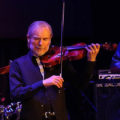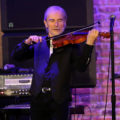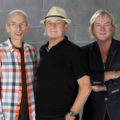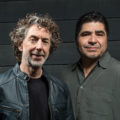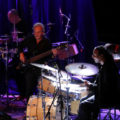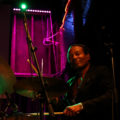French violin virtuoso Jean Luc Ponty to dust off “The Atlantic Years” at City Winery
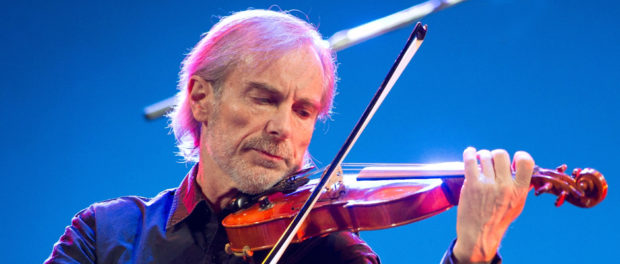 Photo provided by Sochi Winter Arts
Photo provided by Sochi Winter Arts
For more than 50 years, Jean Luc Ponty has endured as one of world’s premiere violin players with solo album sales in the multi-millions. Add in his collaborations with the mythical likes of Frank Zappa, Mahavishnu Orchestra, Return To Forever or Yes’ Jon Anderson (amongst many others), and the French virtuoso is nothing short of legendary. Thankfully even at 74-years-old, this master of jazz fusion, experimental rock and so much more is back on the road this summer, performing a special set entitled “The Atlantic Years” comprised of his most celebrated recordings for the label with many of the original musicians. Ponty checked in with Chicago Concert Reviews prior to a pair of City Winery sell outs (though there’s now a waiting list in case of any last minute availability) to touch on many facets of a resourceful career, some familiar players met along the way and what keeps him musically motivated.
It sure was very encouraging to realize that my playing had such an impact very soon after I started, and now my reward is to discover young players who were inspired by what I started and are eager to keep exploring the use of violin in modern music.
It’s been awhile since you’ve played a concert in Chicago proper. Can you recall any standout shows over the years in our city?
Jean Luc Ponty: Oh yes, I have always had a great connection with the Chicago audience. In fact, when I started my band in 1975, my very first tour started not in Chicago proper, but in Evanston. After that, I performed in almost all the great theaters in Chicago, including the Auditorium, and also really enjoyed performing once at Symphony Hall as a trio with Bela Fleck and Stanley Clarke in 2005.
 In your opinion, why do “The Atlantic Years” have such a special connection with fans?
In your opinion, why do “The Atlantic Years” have such a special connection with fans?
Ponty: I guess those who discovered the albums I produced for Atlantic Records in the ‘70s and ‘80s are eager to re-experience the feelings this music gave them. I share this excitement with the musicians who were in my band and with whom I am touring now.
Will your repertoire focus exclusively on those albums or will you also be sprinkling in favorites from other eras?
Ponty: Since the ‘80s, I have kept recording and performing new albums with new music, so this time we will focus on those albums and revisit some of the pieces which we still find exciting to perform today. All were produced for Atlantic except one piece called “Tender Memories,” which was recorded in 1989 for Columbia. And since we have segments of improvisation in this music, it comes alive again every night. It is not like just rehashing the past.
How easy or difficult was it to get the core original musicians back together?
Ponty: They were all very excited about the idea. We already toured with that concept in South America a few years ago and wanted to do it in the U.S. right after, but had to wait until we were all available.
It didn’t look like Daryl Stuermer was in this edition’s line-up and I see he’s back on the road with Phil Collins this summer. How much have you kept in touch with him over the years and what’s been your opinion of his work with Genesis?
Ponty: We have kept in touch and he invites me each time I can make it to a show he is doing with Phil. I also invite each time I perform in Milwaukee and he even came onstage with us for a jam a couple of times. He is great player and a great guy and I was very happy for him when he was asked to join Genesis very soon after I had started my first band with him. I knew I would miss him, but felt it was a great opportunity for him, and he also did a great job.

Jean Luc Ponty and Jon Anderson
Ponty: Hearing Jon adding vocals so perfectly adapted to the moods of my compositions was truly awesome. Our collaboration on both recording and live performances went very smoothly. Whoever was the composer of a piece would direct the overall production but let the other contribute a few ideas, and the result was very positive. When I was contributing my violin playing on his songs, I treated my instrument more like a human voice than a violin, going more for the emotion than technical virtuosity.
Jon just joined the Rock and Roll Hall of Fame with Yes. Do you have your sights set in that direction or is it not really on your radar? Considering they honor artists of many associations that have influenced rock music and beyond, you’re definitely a worthy contender.
Ponty: No award is really on my radar. It’s nice when it happens, like in France I was made a Knight of the Legion of Honor by the French government and I accepted only because it was suggested by other artists, so I felt grateful to them. Otherwise awards do not make you a better or worse artist. Recognitions from fans are more important to me.

Frank Zappa and Jean Luc Ponty
Ponty: There were two different collaborations. The first one was when my record producer asked Frank to arrange his music for one of my solo albums in 1969 called “King Kong.” His adventurous musical patchwork was new to my ears and opened my mind to explore beyond established musical traditions. Then he asked me to join his band in 1973, and I was surprised to discover how strict and perfectionist he was as a bandleader, which I was accustomed to in classical music, but did not expect in rock. But I quickly understood that his approach was the right one to achieve the best performances possible.
When you were with the Mahavishnu Orchestra, did you realize you were re-writing the jazz fusion rules or were you simply going about what you feeling at the time?
Ponty: I was going about what I felt. My primary goal was not to re-write rules, but to build a personal musical concept based on the different musical experiences I already had at the time. Not being subjected to traditional rules was the first revolutionary step, then it was up to what each artist of my generation had to offer.
George Martin called “Apocalypse” one of the best records he’s ever made, which is quite a compliment given his catalogue. What was he like to work with during those sessions?
Ponty: He was a great producer and a real gentleman. I could tell he appreciated my playing and also French wine and food, which we shared during the recording (laughter). But I was impressed by his producing experience and the validity of his advice during the recording, both in regard to the musical arrangements, as well as the recording technology with his recording engineer since we recorded at his Air Studios in London, which had some of the top recording equipment at the time.

Jean Luc Ponty and Return To Forever
Ponty: There are several, but just to mention a more recent one, I would say being invited to tour for a year around the world in 2011 with Return To Forever and getting to know Chick Corea, Stanley Clarke and Lenny White in more depth musically, pushing each other’s limits because we have a lot of musical affinities. And I now enjoy doing a new acoustic jazz trio with Gypsy French, amazing guitarist Bireli Lagrene and Kyle Eastwod, son of Clint, on double bass.
It’s because of you that “Down Beat” created a violin category for its critics’ poll. How aware were you of what a significant impact you were making and continue to make?
Ponty: It sure was very encouraging to realize that my playing had such an impact very soon after I started, and now my reward is to discover young players who were inspired by what I started and are eager to keep exploring the use of violin in modern music. I invited a few of them to join my band on a few pieces during this tour when performing in their area.
In addition to being a musical innovator, you were also one of the first jazz musicians to ever make a music video. How did the idea to string together time lapse images with your song “Individual Choice” come about?
Ponty: The film producer/cameraman Louis Schwarzberg, who was working for Hollywood Studios, had done a revolutionary short movie and he contacted me saying he was a fan and asked if he could use my music. When I saw his film, I was so impressed I immediately accepted and suggested that he use the title track of my album “Individual Choice,” which I had just recorded. I worked with him on editing his images so they would match the rhythm of my piece. Since neither him nor me were doing it for the money, I let him use my music and he let me use his film as a promo video for my album. The originality was that unlike real promo videos, I was not appearing in this film. It was a real piece of art and was a huge success around the world.
You seem to have a constant creative spirit that’s gone in so many fascinating directions over the years. Do you have a regular source of inspiration (musical, personal, spiritual) or does it change depending on the project?
Ponty: Sometimes a particular composition is inspired by an event such as the passing away of a close relative or friend. Other times I have been inspired by nature, like while walking in the Amazon forest in Brazil, I started hearing a melody which I later recorded. At other times I cannot tell precisely where the inspiration comes from. A young fan once told me that she found my music to be very metaphysical, and I agree that music belongs to that world where the unconscious often plays a big role.
Jean Luc Ponty performs at City Winery on Monday, June 19 and Tuesday, June 20. For additional details, visit Ponty.com and CityWinery.com/Chicago.

